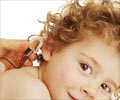Mothers use a higher and varied pitch when they interact with children, while fathers talk to their children like they would to an adult.

In the era of shifting parental roles and increased paternal involvement, Washington State University researchers have investigated whether fathers modify their speech in the same way as mothers do when talking to their babies.
Acoustical Society of America’s study shows that the mothers used a higher pitch and varied their pitch more when interacting with their child than with adults, while fathers did not show the same pattern, but instead talked to their children using intonation patterns more like when they talked to other adults.
Researcher Mark VanDam said that this isn’t a bad thing at all, it’s not a failing of the fathers, and he thinks, that maybe, fathers are doing things that are conducive to their children’s learning, but in a different sort of way.
He added that fathers by speaking to their children more like adults might act as a link to the outside world by helping them to deal with unfamiliar speech.
Furthermore, the fathers’ less frequent use of classic babytalk doesn’t mean that they aren’t modifying their speech in other ways by using different vocabulary, changing the volume or duration of their speech. VanDam believes the age and sex of the child might also influence the father’s interactions.
Advertisement











